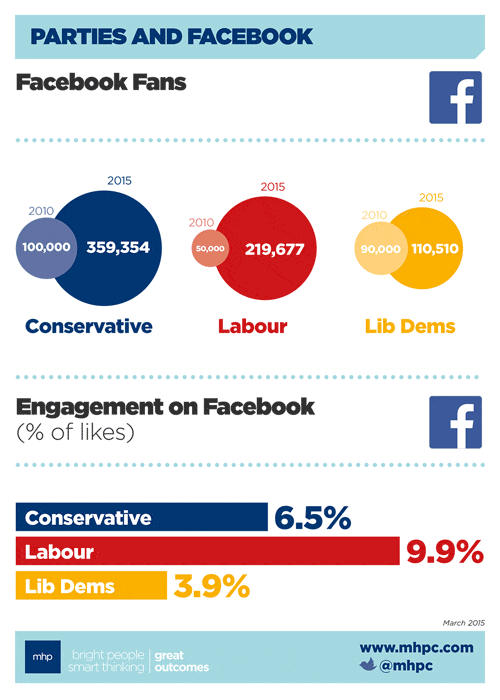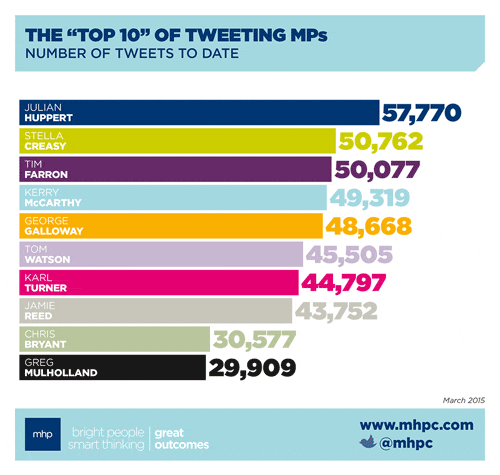 Despite the power social media offers political parties to influence voters just before an election, MPs are failing to make the most of Twitter and Facebook. This is according to a recent report from agency MHP Communications called An Opportunity Lost – How MPs are Missing the Point of Social Media.
Despite the power social media offers political parties to influence voters just before an election, MPs are failing to make the most of Twitter and Facebook. This is according to a recent report from agency MHP Communications called An Opportunity Lost – How MPs are Missing the Point of Social Media.
UK politics is now firmly established on social media, with Conservatives spending over £100,000 a month on Facebook advertising, and MPs sending out around 700,000 tweets a year. However, whilst political parties are starting to use Facebook effectively, most MPs are not using Twitter or Facebook to engage with voters effectively says Neil Stockley, director at MHP Communications.
The report discusses the extent the main political parties use Facebook, describing that at the start of March 2015, Conservatives had over 350,000 followers, Labour had over 200,000 while the Liberal Democrats had over 100,000. When it comes to engagement, it is the Labour party that is ahead with 31,556 (nearly one in five) of its followers being engaged in conversation about the party, compared with 23,236 Conservative followers talking about their party. But none of this means, says Stockley, that UK politics has entered the digital age or that social media will have an impact on the General Election: “First, digital doesn’t cut across all ages and demographics. Some older age groups are far more likely to vote. But they are less likely to use social media than younger ones.
“Second, the statistics that are taken from digital and social channels can suggest outcomes than turn out to be totally different from what actually happens. In the months leading up to the Scottish Independence Referendum, you could have been forgiven for thinking the ‘Yes’ side was heading for a resounding victory, based on the volume of conversation on social media.”

When it comes to Twitter, many politicians are failing to connect with voters, let alone influence them, despite so many using the platform. Stockley describes which MPs are embracing Twitter the most: “The big users of Twitter in the Commons tend to be information and technology enthusiasts, strong local campaigners or headline-grabbing backbenchers. The biggest tweeter, for example, is Julian Huppert, Liberal Democrate MP for Cambridge and a vice-chair of the Parliamentary Internet and Communcations Technology Forum. He posts an average of 57 tweets a day.”
Despite these prolific Twitter users, politicians generally are not using the site as well as they could. Stockley concludes: “Very few MP use Twitter to build a dialogue with their constituents or the wider world.” Twitter does remain most politicians’ digital platform of choice, and this is because, says Stockely, “they see it as a quicker and easier way than, say, Facebook, to get their messages out. Before the last contest just 100 MPs were on Twitter. At last count, over four times as many were using the platform. The Prime Minister David Cameron has the largest number of followers by a long way. After him comes the Labour Leader Ed Miliband and the Leader of the House of Commons, William Hague.”

Methodology
MHP Communications used Twitonomy to gather statistics on Twitter, and the data used for this feature was correct as at 11 March 2015. Facebook data was gathered on 4 March 2015.
PR Masterclass: The Intersection of PR and GEO
Join PRmoment for a Masterclass featuring 10 of the industry’s foremost experts. You will walk away with a clear, actionable strategy for adapting your content to an AI-first search environment.
Taking place on Wednesday 25th February in London, both virtual and in person tickets are available.
Early bird ticket sale ends Friday 9 January.
PR MasterclassIf you enjoyed this article, sign up for free to our twice weekly editorial alert.
We have six email alerts in total - covering ESG, internal comms, PR jobs and events. Enter your email address below to find out more:









